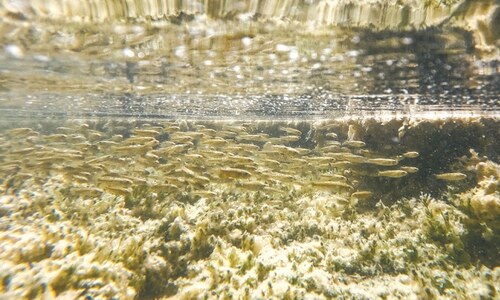TEHRAN: The American embassy in Tehran has been turned into a museum - the "Den of Spies" - where numerous documents and pictures are supposed to prove to the world the "imperialistic nature of the Great Satan".
On November 4, 1979, Washington's decision to receive the late Shah for medical treatment in the United States provoked students - at that time still loyal to the Islamic revolution - to occupy the US embassy in Tehran
The 52 hostages were eventually freed 444 days later, following intensive shuttle diplomacy, but the move left a major impact on Iran's future developments, still tangible 25 years later.
"We are still suffering from the aftermath of the embassy occupation," said one of the students of that time, who preferred not to be named because of his current official post.
The ensuing sanctions affected not only civil aviation but also lucrative oil and gas projects. The country's nuclear programme also remains blocked owing to the political differences, even though it was the Americans who initially proposed that Iran start nuclear technology as an energy substitute for oil and gas.
"The nuclear dispute in Vienna shows once again that Iran's political isolation will not come to an end without a revision towards the US," a European Union diplomat in Tehran said.
The head of Iran's Atomic Energy Organization, Gholam-Reza Aqazadeh, has a similar viewpoint.
"Technical issues, too - such as Iran's nuclear programme - can't be pursued without first settling the political disputes," he said.
The hostility wave is expected by many observers to continue regardless of whether George W. Bush or John F. Kerry enter the White House next year.
But any rapprochement with Kerry could be more realistic than with Bush, whose placing Iran among the "axis of evil" not only deeply angered his Iranian counterpart Mohammad Khatami, but also affronted Iranian national pride.
"May God soon punish Bush for all his wrongdoings against Iran," the conservative Ayatollah Emami Kashani said, clearly wishing him defeat in the presidential elections.
Although Kerry is also expected to continue tough policies against Iran's clergy, Tehran at least hopes to gain some advantages through the Democrat's closer consultation with Europe in world affairs, especially those affecting the Middle East and Gulf.
Many observers regard the embassy occupation as the beginning of the Islamic movement, without which some international developments could have assumed different directions.
Despite fundamental ideological differences, the two sides could still have had constructive cooperation. The US would have been able not only to compete with Iran's leading trade partners Germany and Japan, but also gain political advantages.
With the help of Iran's clergy leaders, the American problem with anti-Israeli militia operations - at least with regards to the Hezbollah group in southern Lebanon - could have been reduced.
Tehran might have even dropped some of its antagonistic approach to the Middle East peace process, and helped the Americans in the dilemma in Iraq, especially in the Shia-populated south.
Another undeniable bond lies with the almost three million Iranians residing in the US.
Their personal qualifications and capital could play a major role in Iran's future development, even if many have already become US citizens.
But all short-term efforts by both sides at least to reduce hostilities have failed. Washington still brands Tehran as advocator of state-terrorism, while "Death to the USA" slogans still echo across state-organized political events in Iran.
Reform-oriented President Mohammed Khatami termed the embassy occupation,in retrospect, as "an outcry of an oppressed nation in a revolutionary phase, which would not happen again".
Ebrahim Asgarzadeh, one of the students at the embassy, branded the occupation as "a Kamikaze act which was right at that time but would no longer make sense".
There is meanwhile irony in the ensuing fates of some of the students who occupied the embassy.
Mohammad-Reza Khatami, the president's younger brother, is now a main challenger to the clergy system as head of the reform party IIPF. So is his party friend Mohsen Mirdamadi. Both were pushed by the administration into opposition.
The translator for the students, Massumeh Ebtekar - known at the time as "Sister Mary" - has been vice-president under Khatami since 1997, in charge of the Department of Environment. Ebtekar is now also among main opponents of Islamic fundamentalism.
And last but not least, the leader of the students, Abbas Abdi, is languishing in jail for having published what is deemed a false survey stating that more than 70 per cent of the Iranian people favour resuming ties with the United States.-dpa














































Dear visitor, the comments section is undergoing an overhaul and will return soon.